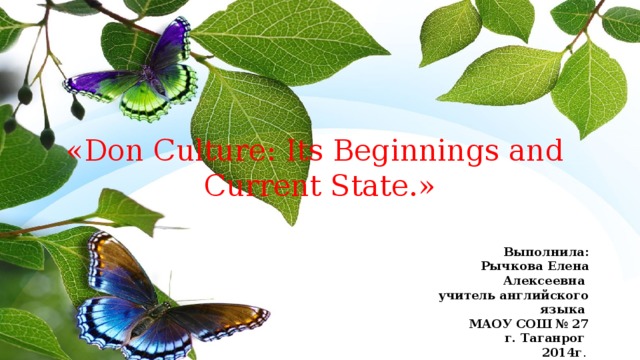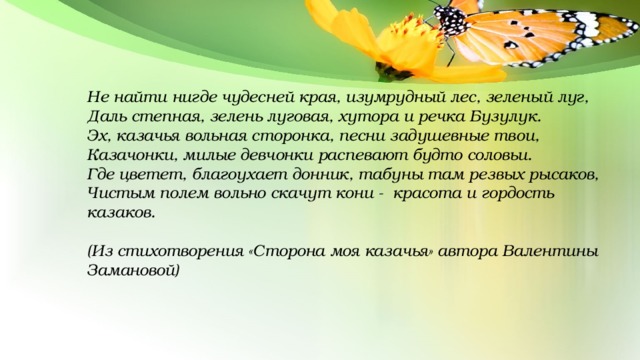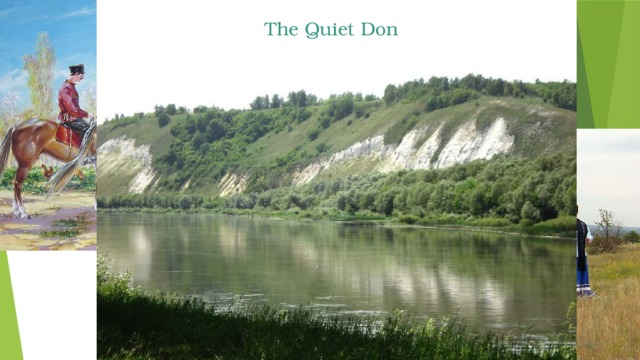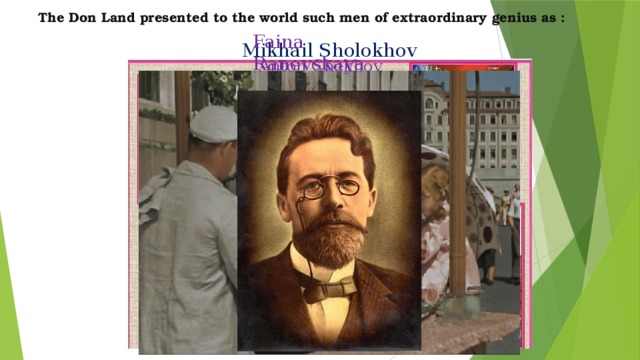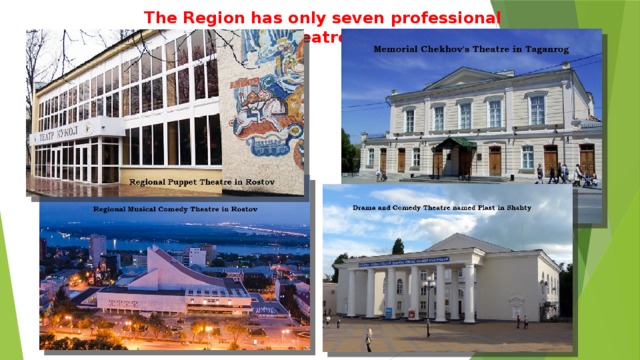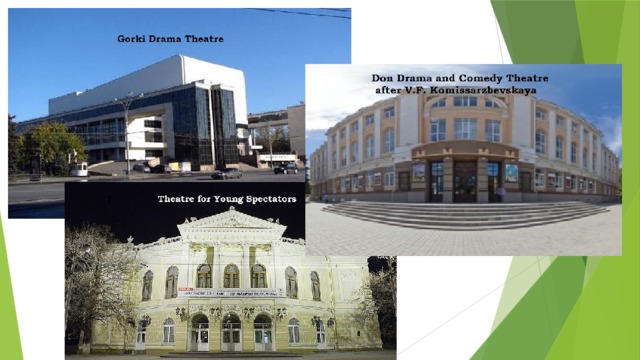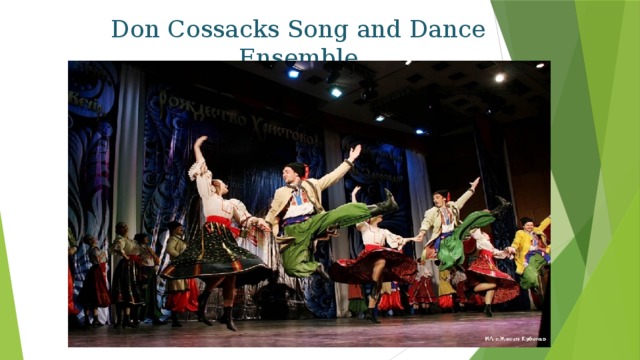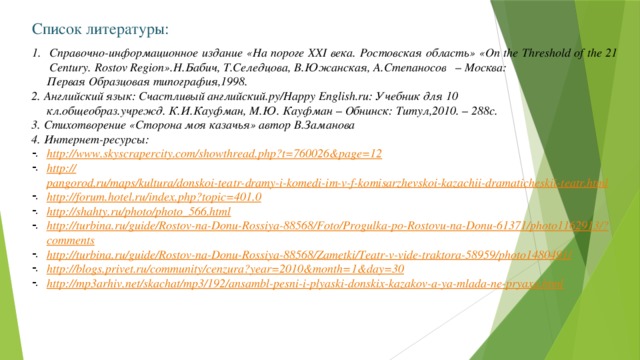Прочитайте текст и выполните задания к тексту.
The culture of the Don Cossacks is unique; the way unique is the social community that gave birth to it. This culture appeared due to the fusion of various elements referred to different cultures: Slavic, Mongolian, Turkic, Greek, Armenian, etc. The largest gem in the Don Cossacks’ treasure-trove is Don-land folklore.
The folklore of the Don Cossacks is sometimes called the art of soldiery craftsmen. Indeed, it contains many war and marching songs with rather a harsh melody. However numerous are love, family, party dance, hunter, roundel, calendar and ceremonial.
The most respected and popular hero of a Cossacks song is the Quiet Don. The river is the symbol of free life, it is the father and breadwinner of the people.
The Don Land presented to the world such men of extraordinary genius as Anton Chekhov, Mikhail Sholokhov, great actress Faina Ranevskaya, prominent actor and stagecraft theoretical Mikhail Chekhov and many others.
The Don-Land history knew such theatrical peaks that might suppose that by the end of the 20 century there would have been not less theatres here than in Paris. However today the Region has only seven professional theatres. These are Don Drama and Comedy Theatre after V.F. Komissarzbevskaya (Cossack Drama Theatre) in Novocherkassk, Memorial Chekhov’s Theatre in Taganrog, Drama and Comedy Theatre named Plast in Shahty, Regional Puppet Theatre and Regional Musical Comedy Theatre in Rostov. The two other Rostov theatres – Gorki Drama Theatre and Theatre for Young Spectators, both bear the title of Academic. With the new season the Don-land theatres show new performances based on the world classical drama pieces.
The Don-Land is known for its choirs too. The brightest representatives of choral art are Pevchiye Dona headed by Viktor Goncharov, Anastasia (directed by S.Tarakanov), Choir Lik of Taganrog.
Don Cossacks Song and Dance Ensemble (director A.Kvasov) is called the carte-de-visite of Don Land. Festivals named Don Musical Spring have been regularly held in the Region during the last quarter of a century.
In March 2007 Rostov Film Studio celebrated its 80th anniversary. In what concerns the number of documentary films and newsreels produced, it was considered the third one in the USSR for a long period of time (after the studios of Moscow and Leningrad). Among the television films showing the Don-Land history, rather prominent is the trilogy by Y.Kalugin (Dontelefilm) dedicated to the events of the Civil War.
Since the late 1980s, the Don Land becomes a festival centre. Rostov is now a place where organized are MINIFESTs – international festivals of performances for children and young people, all-Russian jazz competitions, all-Russian “bardic” songs.
Traditional now have become folklore events in stanitsas Starocherkasskaya and Vyoshenskaya.
Various city, towns and stanitsa events are organized during the last years in the Don Land. Most local professional and amateur art companies participate in them.
As you see, the Don Land is the beautiful and we are proud of our native place.
Cossack - [ˈkɔsæk] казак m (man) казачка f a fusion - [ˈfju:ʒən] сплав m
a gem - [dʒem] сокровище n a craftsmen [ˈkrɑ:ftsmən] мастер m
amateur [ˈæmətə:] любительский
Ответьте на вопросы
Why is the culture of the Don Cossacks so unique?
What is the largest gem in the Don Cossacks’ treasure?
The most respected and popular hero of a Cossacks song is the Quiet Don, isn’t it?
Do you want to hear the Cossacks song?
How many theatres has the Region now? What theatres do you know?
When did Rostov Film Studio celebrate its 80th anniversary?
Подберите лучший заголовок к тексту
The Don Region.
The History of Rostov Region.
The Don Cossacks.
Don Culture: Its Beginnings and Current State.
Подберите английские эквиваленты к словосочетаниям.
Культура донского казачества уникальна.
Донской фольклор
Военные песни
Герой казачьей песни – Тихий Дон
Донской театр Драмы и Комедии
Расскажите другу как вы понимаете пословицу «There is no place like home».
Методические рекомендации
Описание материала: Предлагаю Вам конспект урока по теме «What would you tell about Russia?». Этот материал будет полезен для обучающихся 10 класса. Урок направлен на привитие чувства гордости за родной край.
Цели урока: Совершенствование коммуникативной культуры ученика, воспитание любви к родному краю, патриотизма.
Развивающие: развивать внимание, самостоятельность, логическое мышление, развивать познавательную деятельность обучающихся, закрепить грамматические навыки, развивать умения быстрого выполнения разноплановых заданий, развивать умение выделять главное, развивать и поддерживать интерес к изучению английского языка.
Воспитательные: воспитывать любовь к родному краю, повысить интерес к истории казачества, содействовать нравственному воспитанию обучающихся на привитии чувства гордости за родной край.
Практические: совершенствование знаний и умений по чтению, развитие умения систематизировать учебный материал и уметь применять его в учебной ситуации.
Задачи урока:
Практическая: развитие навыков чтения с целью извлечения информации, развитие навыков письменной речи.
Общеобразовательная: расширение общего кругозора обучающихся, расширение словарного запаса.
Воспитательная: формирование стремления к совершенствованию своей речевой практической деятельности.
Развивающая: развитие способности к сравнению и сопоставлению, к формулированию выводов из прочитанного.
Тип урока: Урок применения метапредметных и предметных знаний
Оборудование: презентация Power Point, раздаточный материал, аудиоматериал, Счастливый английский.ру/Happy English.ru: Учебник для 10 кл.общеобраз.учрежд. К.И.Кауфман, М.Ю. Кауфман – Обнинск: Титул,2010. – 288с.
Ход урока:
Организационный момент.
Ознакомление обучающихся с темой урока. Учитель знакомит обучающихся с темой урока «What would you tell about Russia?»
Подготовка к основному этапу: целеполагание, мотивация.
Учитель создает речевую ситуацию, с помощью которой вводится лексическая тема «Расскажи о своей стране». Обучающиеся учатся осуществлять межличностное и межкультурное общение, применяя знания о национально-культурных особенностях своей страны и страны изучаемого языка. Обучающиеся учатся представлять родную страну и культуру на иностранном языке.
Работа с текстом. Обучающиеся самостоятельно работаю с текстом.
Монологическая речь по теме «What would you tell about Russia?» Учитель предлагает обучающимся высказаться о прочитанном тексте.
Диалоги о России и англоговорящих странах. Учитель предлагает обучающимся составить диалоги с опорой, представленной на доске.
Релаксация. Обучающиеся слушают песню «We are the WORLD» с опорой на раздаточный материал.
Подведение итогов урока. Рефлексия.
Учитель задает домашнее задание на следующий урок и оценивает работу обучающихся. Учитель предлагает обучающимся оценить урок путем ответов «да» или «нет» на следующие утверждения:
Write “yes” or “no”:
I understood everything. (Я понял все.)
It was difficult for me to speak English. (Мне было трудно говорить по-английски.)
I am satisfied with my work. (Я доволен своей работой.)
I liked the presentations. (Мне понравились презентации.)
I learnt something new at the lesson. (Я узнал что-то новое на уроке.)
Затем учитель просит сдать листочки.
